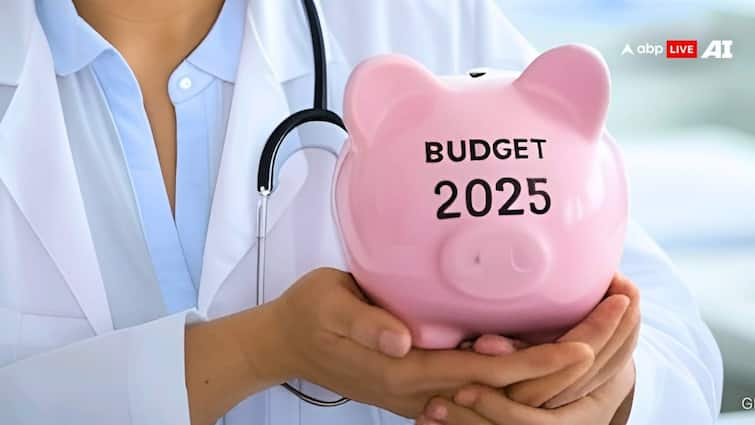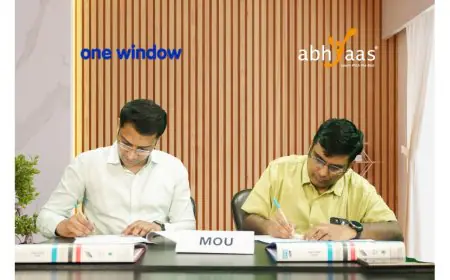Budget 2025 Expectations: Better Insurance Coverage, Lower GST On Medical Devices, And More, Here’s What The Health Sector Wants
What to expect as Finance Minister Nirmala Sitharaman will stand up to present the Union Budget 2025 in Parliament on February 1 this year? Will she walk in and read from a digital tablet wrapped in a traditional 'bahi-khata' style pouch as in the previous budget speech? While it is likely that the FM will present her eighth consecutive budget in a paperless format just like the previous years, what can the Health sector expect from this Union Budget? Focusing on health sector allocations and reforms in a country's annual budget is crucial for ensuring accessible, affordable, and quality healthcare, which directly impacts the well-being and productivity of its population. Prioritising healthcare also strengthens a nation's resilience to public health emergencies, reduces economic inequality, and supports long-term sustainable development. As the Union Budget 2025-26 is approaching, the Health sector is pinning high hopes on steps that will prioritise healthcare for all so that it becomes an asset and catalyst to the nation's economic prosperity while enhancing the operational efficiency of its constituents. Industry stakeholders anticipate increased tax incentives, policies to simplify insurance as well as taxation, and measures to promote research and development ecosystem, in turn, incentivising private players such that it could further boost the enterprising spirit within the sector. Increase Fund Allocations to Health Sector Surjeet Thakur, Founder & CEO of TrioTree Technologies draws the attention to the funds allocation to Health sector in Union Budget after Union Budget. While highlighting the urgency for the government to prioritise healthcare spending, Thakur laments that the budget allocation to Health sector currently stands at less than 2 per cent of GDP. “For a nation of our size and population, this is insufficient. Increased investments in healthcare infrastructure, such as building new hospitals and medical colleges, are essential to address the pressing need for skilled manpower. Currently, India has just 1.3 doctors per 1,000 people, and this gap can only be bridged by expanding medical education and training programs, possibly through public-private partnerships,” Surjeet Thakur says. “Additional funding for the National Digital Health Mission (NDHM) is expected to drive integration of telemedicine, digital health records, and AI-powered diagnostic tools into the healthcare delivery ecosystem,” says Dr. Shrey Srivastava, CEO-Doctors on Duty (DOD). ‘Doctors On Duty’ is Android and IOS App based Integrated and seamless healthcare ecosystem. “A significant increase in healthcare spending, targeting 3 per cent of GDP as per the National Health Policy, is expected. This would bolster public health infrastructure and help address regional disparities in healthcare access,” Dr Shrey Srivastava shares his great expectations from the Finance Minister’s Budget roll out this year. Reward, Foster, and Promote R&D in Medicine Surjeet Thakur says the government should focus on fostering indigenous medical research and development. While batting for the incentivisation of private players and funding for public-sector initiatives, Thakur reminds the government that India’s leadership during the COVID-19 pandemic demonstrated its potential in this field – and that encouraging indigenous medical research will go a long way in reducing our reliance on international resources. Dr Shrey Srivastava demands enhanced funding for indigenous vaccine research, drug discovery, and biotechnology is necessary to foster innovation and promote self-reliance in the pharmaceutical sector. Dr SC Nagendra Swamy, President, Ramaiah Memorial Hospital, Bengaluru calls for incentives for domestic manufacturing of medical devices and advanced diagnostic tools so as to help reduce import dependency, enhance affordability, and create opportunities for skill development. Also Read : Budget 2025 Expectations: A Look At What India's Smart Cities Want From The Union Budget Expand Health Insurance Coverage To OPD Patients While appreciating all the measures the government has undertaken to strengthen the healthcare sector and make quality care more accessible, Dr Sharmila Tulpule, Founder & Director, Orthobiologix Biotech Pvt. Ltd says a few key areas deserve attention and shares her suggestions on how to accelerate this progress. “The newer medical procedures and other outpatient services under health insurance coverage would greatly benefit patients. Many patients avail outpatient care, including consultations, diagnostics, and day care procedures without needing hospitalisation but may still be expensive to pay out of pocket. Insurance coverage for these services would ease financial pressures and promote early diagnosis and preventive care,” Dr Sharmila Tulpule says.Tax benefits for preventive health check-ups

What to expect as Finance Minister Nirmala Sitharaman will stand up to present the Union Budget 2025 in Parliament on February 1 this year? Will she walk in and read from a digital tablet wrapped in a traditional 'bahi-khata' style pouch as in the previous budget speech? While it is likely that the FM will present her eighth consecutive budget in a paperless format just like the previous years, what can the Health sector expect from this Union Budget?
Focusing on health sector allocations and reforms in a country's annual budget is crucial for ensuring accessible, affordable, and quality healthcare, which directly impacts the well-being and productivity of its population.
Prioritising healthcare also strengthens a nation's resilience to public health emergencies, reduces economic inequality, and supports long-term sustainable development.
As the Union Budget 2025-26 is approaching, the Health sector is pinning high hopes on steps that will prioritise healthcare for all so that it becomes an asset and catalyst to the nation's economic prosperity while enhancing the operational efficiency of its constituents.
Industry stakeholders anticipate increased tax incentives, policies to simplify insurance as well as taxation, and measures to promote research and development ecosystem, in turn, incentivising private players such that it could further boost the enterprising spirit within the sector.
Increase Fund Allocations to Health Sector
Surjeet Thakur, Founder & CEO of TrioTree Technologies draws the attention to the funds allocation to Health sector in Union Budget after Union Budget. While highlighting the urgency for the government to prioritise healthcare spending, Thakur laments that the budget allocation to Health sector currently stands at less than 2 per cent of GDP.
“For a nation of our size and population, this is insufficient. Increased investments in healthcare infrastructure, such as building new hospitals and medical colleges, are essential to address the pressing need for skilled manpower. Currently, India has just 1.3 doctors per 1,000 people, and this gap can only be bridged by expanding medical education and training programs, possibly through public-private partnerships,” Surjeet Thakur says.
“Additional funding for the National Digital Health Mission (NDHM) is expected to drive integration of telemedicine, digital health records, and AI-powered diagnostic tools into the healthcare delivery ecosystem,” says Dr. Shrey Srivastava, CEO-Doctors on Duty (DOD). ‘Doctors On Duty’ is Android and IOS App based Integrated and seamless healthcare ecosystem. “A significant increase in healthcare spending, targeting 3 per cent of GDP as per the National Health Policy, is expected. This would bolster public health infrastructure and help address regional disparities in healthcare access,” Dr Shrey Srivastava shares his great expectations from the Finance Minister’s Budget roll out this year.
Reward, Foster, and Promote R&D in Medicine
Surjeet Thakur says the government should focus on fostering indigenous medical research and development. While batting for the incentivisation of private players and funding for public-sector initiatives, Thakur reminds the government that India’s leadership during the COVID-19 pandemic demonstrated its potential in this field – and that encouraging indigenous medical research will go a long way in reducing our reliance on international resources. Dr Shrey Srivastava demands enhanced funding for indigenous vaccine research, drug discovery, and biotechnology is necessary to foster innovation and promote self-reliance in the pharmaceutical sector.
Dr SC Nagendra Swamy, President, Ramaiah Memorial Hospital, Bengaluru calls for incentives for domestic manufacturing of medical devices and advanced diagnostic tools so as to help reduce import dependency, enhance affordability, and create opportunities for skill development.
Also Read : Budget 2025 Expectations: A Look At What India's Smart Cities Want From The Union Budget
Expand Health Insurance Coverage To OPD Patients
While appreciating all the measures the government has undertaken to strengthen the healthcare sector and make quality care more accessible, Dr Sharmila Tulpule, Founder & Director, Orthobiologix Biotech Pvt. Ltd says a few key areas deserve attention and shares her suggestions on how to accelerate this progress.
“The newer medical procedures and other outpatient services under health insurance coverage would greatly benefit patients. Many patients avail outpatient care, including consultations, diagnostics, and day care procedures without needing hospitalisation but may still be expensive to pay out of pocket. Insurance coverage for these services would ease financial pressures and promote early diagnosis and preventive care,” Dr Sharmila Tulpule says.
Tax benefits for preventive health check-ups and enhanced exemptions on health insurance premiums can encourage proactive healthcare measures, says Dr SC Nagendra Swamy. “Expanding universal health insurance schemes, particularly for the underserved middle-income population, will make quality care more accessible,” Dr SC Nagendra Swamy says.
Reduce GST & Customs Duty on Medical Devices
Dr Sharmila Tulpule also appeals for the reduction of GST and Customs Duty on medical devices and surgical inputs. “This step could help lower treatment costs, making advanced procedures and life-saving interventions more affordable for patients,” she adds.
“Health insurance should become more accessible. Waiving GST on health insurance premiums, as previously suggested by Mr. Nitin Gadkari, could encourage wider adoption and benefit citizens,” says Surjeet Thakur of TrioTree Technologies.
Dr Shrey Srivastava says that the private sector players are hopeful for tax benefits on investments in hospitals, MedTech innovation, and start-ups focusing on healthcare delivery in rural and underserved areas.
Also Read : Budget 2025 Expectations: Lease GST, Tax Credit Norms And More, What The Commercial Real Estate Sector Wants
Geriatric & Palliative Care Need More Impetus
Dr Sharmila Tulpule highlights the growing need to focus on geriatric and palliative care. “With an aging population and the increasing prevalence of chronic illnesses, establishing dedicated programs for holistic elderly care and long-term health management is essential,” Dr Sharmila Tulpule says.
Surjeet Thakur, Founder & CEO of TrioTree Technologies also seeks the spotlight to be focussed on another critical area – that is mental health, which continues to be stigmatized and underfunded. “Awareness campaigns and dedicated spending in this area are needed to tackle issues like depression, which significantly affect productivity and social dynamics,” Thakur says. Triotree Technologies is a leading healthcare IT company with a global presence and is revolutionizing workflows with its digital systems.
Encourage Robotics, Advanced Diagnostics, Regenerative Medicine
Dr Tulpule feels that encouraging emerging fields like regenerative medicine, robotics, and advanced diagnostics will drive innovation and position India as a leader in medical advancements.
While batting for the focus to shift toward building a resilient and inclusive healthcare ecosystem through policies in the Union Budget 2025, Dr. Rakesh Gupta, Chairman, Sarvodaya Healthcare says, “With India’s healthcare industry projected to reach $683 billion by 2025, investments in emerging trends like Remote Patient Monitoring (RPM), AI-powered diagnostics, and digital therapeutics (DTx) are crucial to address the dual challenges of accessibility and affordability.”
While lauding India’s digital health initiatives like Ayushman Bharat Digital Mission, Dr Rakesh Gupta highlights that technologies such as block-chain and personalized medicine will be key drivers of progress.
Dr Shrey Srivastava highlights the need to realise the use of Artificial Intelligence (AI) in medicine. Seeking support for digital health initiatives, Dr Shrey Srivastava says, “Additional funding for the National Digital Health Mission (NDHM) is expected to drive integration of telemedicine, digital health records, and AI-powered diagnostic tools into the healthcare delivery ecosystem.”
Seeking encouragement for Healthcare startups, Dr Shrey Srivastava says, “The sector seeks dedicated funding, grants, and incentives for start-ups leveraging AI, IoT, and robotics to develop innovative healthcare solutions. Additional measures such as tax holidays, relaxed compliance norms, and better access to government procurement platforms are anticipated to promote affordable healthcare solutions, particularly in diagnostics and remote monitoring.”
Say Hello to Genome Testing, Ride the Genetics Wave
Surajit Chakrabartty, CFO, MedGenome, says, "We are optimistic that the upcoming budget will recognize the transformative role genomics can play in revolutionizing diagnosis and improving healthcare outcomes.”
MedGenome is a genome sequencing lab offering comprehensive sequencing services. Its website claims that it is "the only CAP accredited Genetic testing lab in India that offers 1300+ genetic tests backed by the best and the latest testing technologies".
Chakrabartty says that over the next 5-7 years, the team at MedGenome anticipates that genomic testing will become an integral part of routine healthcare, driving advancements in early disease detection and personalized medicine. That is why he suggests that the budget should allocate substantial funding for research and infrastructure development in genomics, accelerating the adoption of cutting-edge technologies and ensuring affordable and equitable access to diagnostics across all demographics.
Pandemic Preparedness
Once bitten, twice ready, taking pandemics head on, Dr Shrey Srivastava feels the COVID-19 pandemic has taught us a few lessons in the preparedness for medical exigencies on a global scale. He says investments in disease surveillance systems, upgraded testing facilities, and strategic stockpiling of critical medical supplies will be vital to prepare for future health emergencies. Dr Shrey Srivastava also expresses hope that the latest budget increases investment in medical colleges, paramedical institutes, and skill development programs – all of which are crucial to address the shortage of trained healthcare professionals.
Policies need to be tweaked to strengthen infrastructure, especially in tier-2 and tier-3 cities, is crucial to ensuring equitable access to quality care across India, Dr SC Nagendra Swamy feels.
As India hopes to bolster its position as a global healthcare haven, this budget is an opportunity to pave the way for a stronger, more resilient healthcare ecosystem that meets the needs of all Indians.
(The author is a senior independent journalist)
What's Your Reaction?










































